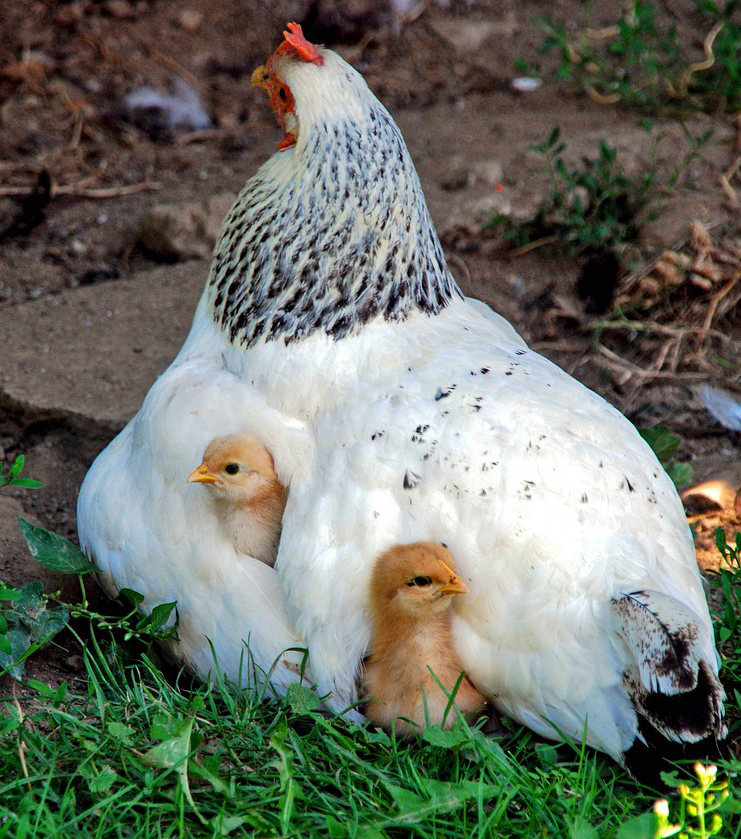
To listen to today’s reflection as a podcast, click here
Each weekday in the month of August, we will pursue “prepositional truth” by zeroing in on a single Greek preposition in a single verse, noting the theological richness so often embedded in the humble words we so often overlook.
Numerous species of birds exhibit a special behavior when it comes to parenting.
They shelter their young with their wings.
A parent’s wings protect from rain. And bright sun. And wind. And predators. Wings provide warmth. And a secure place. And the much-needed gift of time – the time that fledglings need to grow and mature before they head out into the wide, wide world.
Barnyard cats and dogs may close in on helpless chicks, only to see them dive under a hen’s wings. When thinking of humans, we tend to associate “mother hens” with doting, over-protective parenting. But on the farm, few predators – even when they are bigger and stronger – relish the thought of taking on a seriously motivated hen committed to defending her young,
The psalmists frequently attribute such parental commitment to God.
According to Psalms 17, 36, 57, and 63, our safe place is “under the shadow of God’s wings.” The most memorable of those declarations is Psalm 91:4: “He will cover you with his feathers, and under his wings you will find refuge.”
Psalm 91 is one of the Bible’s “high security” texts. Each of its 16 verses seems to shout, “God’s in the driver’s seat here; everything’s going to be OK.”
It includes this remarkable promise: “For he will command his angels concerning you to guard you in all your ways; they will lift you up in their hands, so that you will not strike your foot against a stone” (vs. 11-12).
Satan (who knows the Bible as well as anyone at church camp this summer) used those very verses to taunt Jesus: “Go ahead and jump off the highest point of the temple. That ought to bring the crowds around. This Father of yours promised he would never let you get hurt, right?” (Matthew 4:5-7)
But Jesus wasn’t having it. “It’s also written, ‘Don’t tempt the Lord your God.'” God’s promises of security are not declarations that we are Marvel comics superheroes.
So how, exactly, does God make good on that extraordinary promise of security?
The stunning answer is the willingness of God’s own Son to suffer and die so that we might live.
A preposition tells the story.
As Jesus approaches Jerusalem for the last time – knowing that he is heading for trial, torture, cross, and grave – he sighs, “Jerusalem, Jerusalem, you who kill the prophets and stone those sent to you, how often I have longed to gather your children together, as a hen gathers her chicks under her wings, and you were not willing” (Luke 13:34).
The Greek word translated “under” is Anglicized as HYPO (pronounced who-pah).
It lives on as a prefix in numerous English words, particularly in the realms of science and medicine. A shot is administered by a hypodermic (“under-the-skin”) needle, whereas someone with low blood sugar is said to be hypoglycemic (“under-the-right-level-of-sugar”).
Chickens can only fly short distances. There’s no easy escape from disasters such as a barnyard fire. But a hen will do what she can.
Farmers occasionally report, in the smoldering ruins of an incinerated barn, the discovery of the charred body of a lifeless hen – only to see living chicks scurry out from beneath her wings, having been protected from the flames.
In Psalm 91 we learn that God is the refuge we can always trust. In the story of Jesus we learn just how far God is willing to go to keep that promise.
When God says he will cover us with his feathers, it means he is willing to die for us.
So, what is our role in this drama like no other?
We are called to go HYPO – to place ourselves under the sacrificial work of Christ.
He assures us that He is the only safe place to live out our lives in this wide, wide world.
